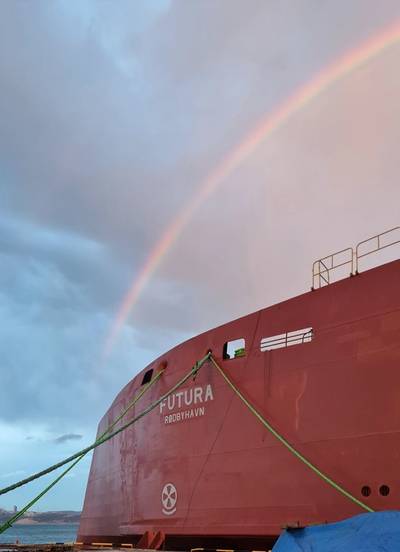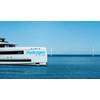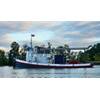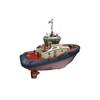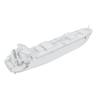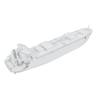Scandlines Launches Zero Emissions Ferry
Scandlines’ new zero direct emissions freight ferry has been launched at the Cemre Shipyard in Turkey.
The ferry will be name Futura and deployed on the Fehmarn Belt between Germany and Denmark (Puttgarden-Rødby) in 2024. It will have a 10MWh energy storage system, the world's largest lithium-ion battery bank to date, which has been supplied by Swiss manufacturer, Leclanché.
The 8.6 meter high ferry charger tower, developed by the German company, StemmannTechnik, is being prepared for installation at ferry berth 3 in Denmark’s Rødbyhavn. It is able to compensate for changes in water level or ferry movements. As the ferry approaches the berth, the charging station is activated, the tower gate opens automatically and the charging plate extends. Once the ferry has moored in the berth, the charging pantograph connects to the onboard unit within a maximum of 15 seconds and starts charging the batteries. After charging, the tower gate rolls down again to protect the components from external influences.
As the ferry will also be able to operate as a hybrid ferry, it also has three MTU gensets.
“With Futura, we make it possible to travel without any direct emissions, as the ferry runs entirely on electricity. At the same time, we have a sharp focus on making the entire journey worth the time - so we have also worked to make the experience on board even better,” says Scandlines CEO Carsten Nørland.
He says that Scandlines plans to keep on sailing for many, many years to come. "We believe in a future for ferries. We invest in a multi-million euro electric ferry, because we have a responsibility to the world around us and because we are convinced that there is a need for journeys that don't just take place behind the wheel on the motorway. This applies to freight drivers, families on holiday and those who just want to go border shopping."
Vessel data:
Length: 147.4m
Breadth: 25.4m
Design draft: 5.30m
Freight capacity: 66 freight units (about 1,200 lane meters)
Max. number of passengers: 140
Service speed: 16/10 knots
Crossing time: 45 minutes (as of 2025)
Battery system: 10 MWh
Charging time in port: 12 minutes (as of 2025)
Direct emissions during the crossing: 0
Investment: 80 million EUR


